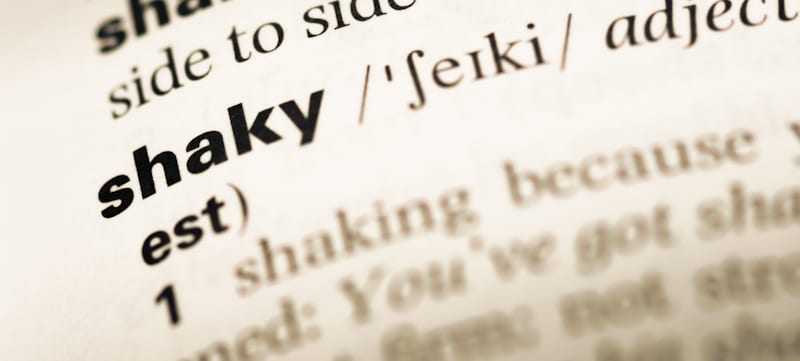It’s safe to say that we aren’t strangers to the word “shaky,” in addition to the fact that we are no strangers to assuming the spelling of a word. Let’s get things shaking and clear up all doubts about these words.
These two words are descriptive words. The distinction between ‘shakey” and “shaky” as adjectives is that “shaky” means shaking or trembling while its counterpart, “shakey,” is an alternative spelling or typo for the word.
In order to understand where these words come from, we must understand their proper meaning.
Definition Of “Shaky”
The word “shaky” can be defined as something weak, unsound, or unsteady, not firm, substantial, or secure. In addition to this meaning, this word can also refer to “not impressive” or “effective.”
It also has a specific meaning when used for “wood” as the context; it is easily shaken; tottering; unsound (of wood). Full of shakes or cracks; cracked. Anxious; Nervous. Trembling or swaying.
Origin Of The Word
This word can be traced back to 1840, when it first appeared in handwriting. People, horses, condition, and credit are all examples of this term. In 1850, it took on its current meaning, “general sense of “uncertainty, or of doubtful integrity.” This word’s grammatical structure is composed of “Shake” + “y.”
“Shake” originates from the 1300th century. It was used to refer to earthquakes on the earth. The meaning “to grip and shake (someone or something else)” dates back to the early 14th century. From the late 14 century on, it was used in reference to shaking a container to combine contents. The meaning “to rid oneself of by abrupt twists” dates from the 1200s, and it was also used in Middle English to allude to avoiding duty, among other things. The meaning “weaken, impair” dates from the late 14th century and is based on the concept of “make unstable.”
“Y” serves as an adjective suffix characterized by” applied to nouns in Old English; used with verbs from the 13th century, and even with other adjectives around the 15th century.
Examples In Sentences
- Her first shaky step nearly took her toppling, but he immediately caught her arm.
- The owner of the wagon reined in the shaky wheels after only a few revolutions.
- He led the way down the shaky wooden steps and cheered me up by telling me about his coal-saving method.
- The inmates had devised a plan to bash down the shaky old stockade and flee for their lives.
- He went about his work enthusiastically, but the bicycle remained shaky until it fully started, and then the steadier he became, the faster he moved.
- Even talking about the place, especially details of our trip up there, puts you on shaky ground.
- Balance impairments, shaky hands or foot movements, and communication problems are common in children with ataxic cerebral palsy.
- They both appeared composed, and I even overheard the judges joking with them, making me shaky!
- After a shaky start against Jamaica, Germany’s defense has only given up one goal in four games.
- A somewhat shaky photograph of a 1930s automobile parked along a residential road.
- He managed to meet her eyes, which was all the more impressive given that he was shaky.
- The majority of the manuscripts were written in Casanova’s handwriting, which I could see rapidly deteriorating over time; you can capture how shaky he was throughout the years.
- They’re often shaky, which scares some kids. The rungs are so widely apart that children’s short legs can’t readily move from one to the next.
- Their relationship appeared shaky, with posts on Nicki Minaj’s website implying that they were having issues.
- Due to the action and attempting to manage your character, the targeting became exceedingly shaky due to the hopefulness of a workable control scheme.
Adjectives + Examples
- Jittery. EX: I was expecting Barcelona would make quick work of it so I could reacquaint myself with civilization after several hours of football and the caffeine making me jittery.
- Wobbly. EX: He helped the wobbly woman up the stairs after paying the bill while she spoke happily about the dinner, the weather, and the steak price.
- Unsettled. EX: She felt unsettled about leaving her lab and looked about as though trying to figure out what to take.
- Unsteady. EX: Pierre walked out of the gate with unsteady steps, returned to his room, sat down on the sofa, and promptly fell asleep.
- Nervous. EX: Donnie began to feel nervous for the first time as the group drew into the parking lot at Mountain Village, the upper portion of the ski area.
Antonyms + Examples
- Certain. EX: Jessica doesn’t really know for certain who Alexa’s boyfriend is.
- Firm. EX: I will speak if necessary, Michael said, his voice still firm but comforting.
- Confident. EX: She felt like a visitor in his throne room, not a woman talking to a stranger tied to her basement wall because his voice was quiet and confident.
- Steady. EX: The support of two smaller parties has been steady with its increase, which could throw the polls off.
“Shaky” In The Medical Field
The term “shaky” also has a medical connotation to it. Someone who is “shaky” would have the following symptoms:
- Depression or post-traumatic stress disorder are examples of psychiatric illnesses.
- Hereditary degenerative diseases, such as hereditary ataxia and fragile X syndrome.
- Abuse or withdrawal from alcohol.
- Poisoning with mercury.
- Hyperthyroidism, or an overactive thyroid, is a condition in which the thyroid gland is overactive.
“Shaky” is best known as “tremor” within the medical field, and this alludes to an uncontrollable and rhythmic shaking condition of the nerve system (neurological). It can affect practically any area of your body, but your hands tremble the most, especially while performing simple actions like sipping from a glass or tying shoelaces.
Where Does The Word “Shakey” Come From?
The word “shakey” comes as a result of an alternative spelling for the word “shaky,” consequently having the same connotation, somewhat unsound or dubious. However, this has not been accepted nor registered as a valid word with an assigned definition. Therefore it is considered a typo.
This word also gained popularity once it started to be used as a personal name. “Shakey” has been found to be of Filipino descent, and it means “Thankfully yours.” We believe that this is more of a suitable use for the word, as it adds sentimental value while preserving the grammatical integrity of its counterpart “shaky.”
Oddly enough, this word also has gained its own “urban” meaning since it’s used amongst contemporary youth as a term that suggests someone is not trustworthy or not capable of sustaining loyal longevity relationships. The more you know.
Differences Between “Shaky” And “Shakey?”
The difference between these two words radicates in the misspelling, as simple as it might sound. There is no other way around it.
“Shaky” is the correct term used when attempting to convey uncertainty when something is not firm. On the other hand, “shakey” has made its rounds and gained notoriety, yet it remains an incorrectly spelled word.
Conclusion
To shake things up a bit and summarize everything, these two words are part of an extensive list of common words that tend to get confused between each other due to misspelling. In this collection of words, we can find the commonly misspelled: “wich/which” and “seperate/separate.” This is not an unusual thing since we’ve seen it happen before when people find themselves assuming that their incorrect spelling is accurate.
That being said, both words are suitable for the same use. This is because they allude to the same thing. However, it all comes down to spelling.
Shawn Manaher is the founder and CEO of The Content Authority. He’s one part content manager, one part writing ninja organizer, and two parts leader of top content creators. You don’t even want to know what he calls pancakes.



